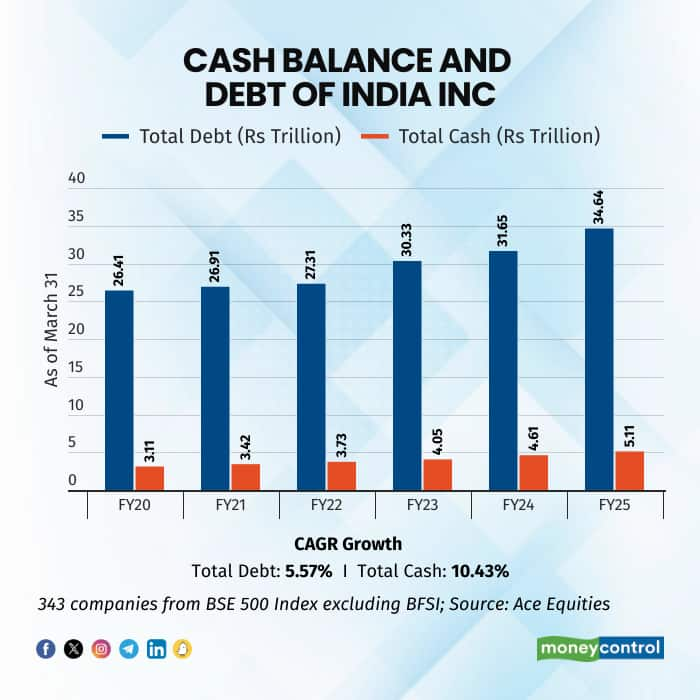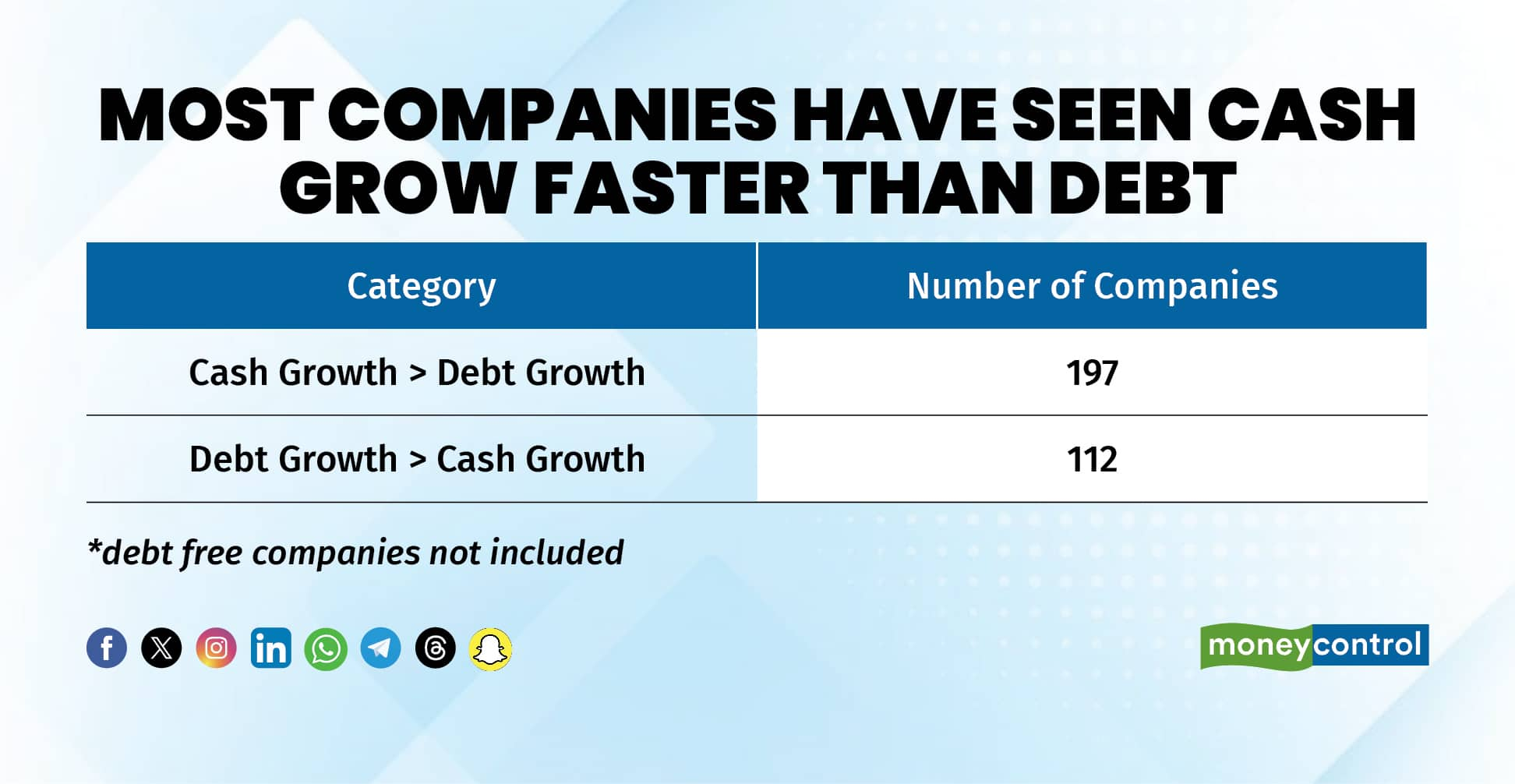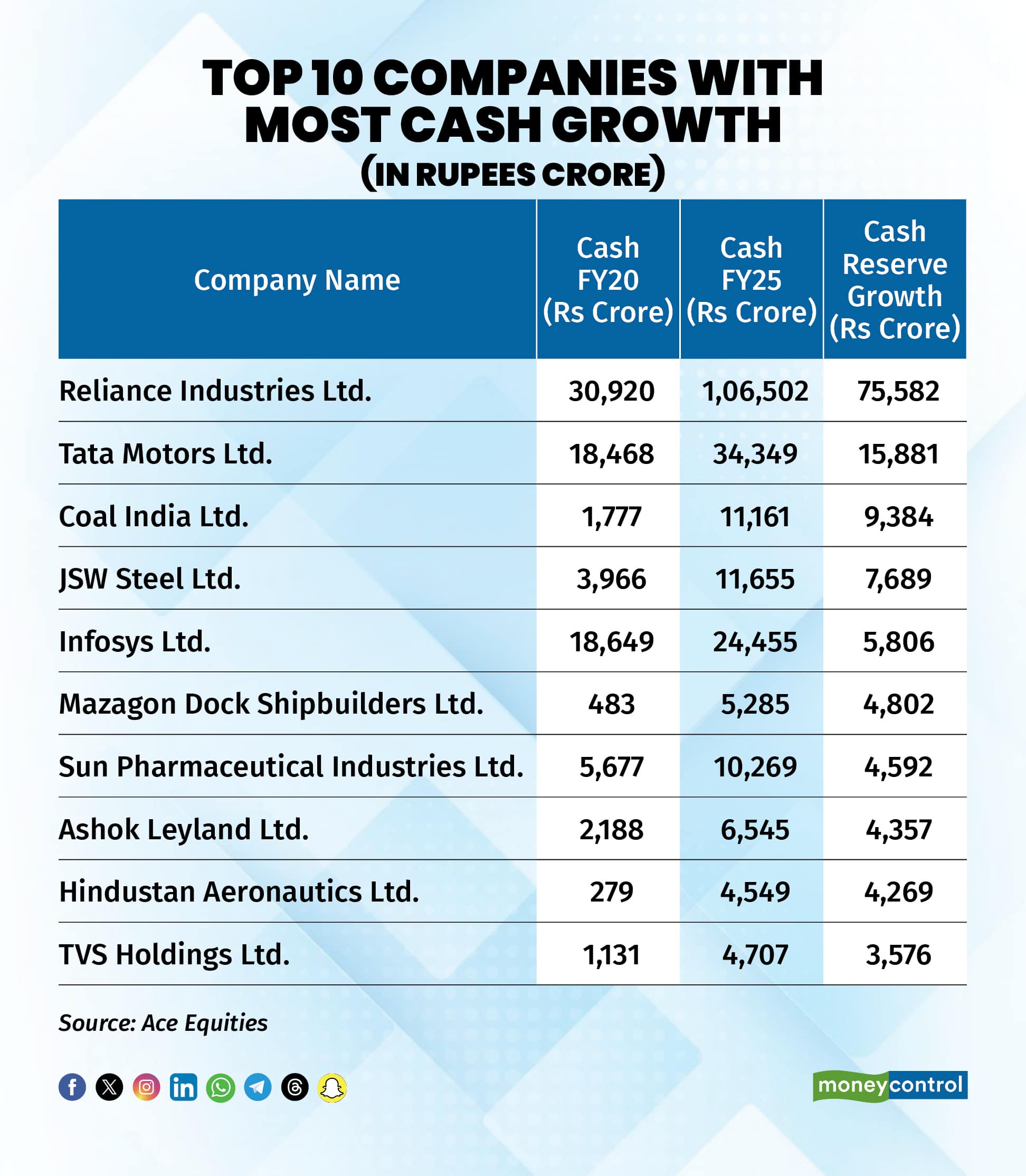



Indian corporates are doubling down on their post-pandemic preference for cash buffers and leaner balance sheets over aggressive borrowing.
Cash reserves of 343 BSE500 index companies (excluding banking and financial services companies) have grown at nearly twice the pace of debt over the past five financial years (FY20–FY25), corporate balance sheet data shows, signalling a marked shift in financial strategy.
India Inc’s cash balances have risen at a compound annual growth rate (CAGR) of 10.43 percent compared to a modest 5.57 percent growth in total debt, data from Ace Equities shows.
The number of companies with positive or zero net debt positions — where cash exceeds or matches debt — has increased significantly since FY20, data shows.
Total debt on the balance sheet of these 343 companies stood at Rs 34.64 trillion as of March 31, 2025, while they had Rs 5.1 trillion cash in their bank accounts. The total debt for these companies at the end of FY20 stood at Rs 26.4 trillion and cash balance at Rs 3.1 trillion.

India Inc’s strategy to build bigger cash reserves comes at a time when businesses across the world are grappling with economic uncertainties stemming from high interest rates, supply-chain realignments, tariff wars and geopolitical disruptions.
From the Russia-Ukraine conflict to US President Donald Trump’s tariff war, businesses have faced mounting pressure to preserve liquidity and de-risk operations.
Caution over growth
Experts view the rising cash buffers as a sign of increasing financial conservatism in India Inc, shaped by both global and domestic macroeconomic shifts.
“This trend is a clear signal of growing financial conservatism and a deliberate shift toward balance-sheet strengthening across India Inc,” said Feroze Azeez, joint CEO at Anand Rathi Wealth. He pointed to improved cash flow generation and better strategic capital allocation as core drivers.
The sharp increase in policy rate — from 4 percent to 6.5 percent between 2022 and 2025 — made debt costlier, pushing companies to either repay or put off borrowings.
The rate now stands at 5.5 percent after the Reserve Bank of India’s 100 basis points cuts this year, so far.
“Many firms used the IPO and QIP windows not just to raise growth capital but also to deleverage,” Azeez added. Post-Covid, liquidity became a priority as firms sought buffers against future shocks, he said.
Bhavesh Shah, managing director and head of investment banking at Equirus Capital, echoed the sentiment. “Post-Covid, there has been a considerable change in the mindset of managements running business finances. During that period, companies which had cash survived well. That period has built in some element of conservatism in the mindset of the corporates,” Shah said.
Data shows that between FY20 and FY25, nearly 200 companies, out of 343, saw their cash positions grow faster than their debt and about 130 firms are now net debt-free.

Experts say this transformation of corporate India’s balance sheets is a result of disciplined execution and recalibrated growth strategies.
“The inherent strategies of several companies revolve around growth, better margins, higher operational cash flow, efficient working capital management, and better utilization of capital,” Shah explained. “What we are seeing now is a good implementation of all these strategies culminating in better cash generation.”
According to Azeez, the post-covid capex cycle has been selective—focused more on asset-light models or digital initiatives.
“Large-scale industrial or infrastructure capex is still emerging,” he said. He added that the shift in consumer preferences—from goods to services—was also reducing the capex intensity of Indian businesses.
Structural shift
While the cash buildup may appear as a temporary response to pandemic-driven caution and geo-political tensions, experts argue that the data points to a long-term strategic shift in corporate India’s approach to leverage and liquidity management.
“While post-pandemic caution may have triggered the initial impulse, the further continuity of this behaviour suggests a more structural evolution,” said Azeez. “Companies have become more mindful of capital structure choices, driven by external macro conditions like higher interest rates and tighter global liquidity.”
According to Shah, burning cash for growth, rampant during peak private funding periods, has become very selective.
Another factor underpinning the shift is sentiment, with market investors now rewarding companies that demonstrate discipline, strong cash flows, and low leverage, experts say.
“Investor preference for companies with low or zero debt has become visible,” said Azeez.

Buoyant markets
India’s robust stock markets are adding to corporate India’s efforts to shore up balance sheets, experts say. Equity markets will remain a key source of capital, not just for expansion, but for further deleveraging.
“The buoyancy in equity markets, supported by strong domestic liquidity and investor appetite for quality paper, has enabled many companies to raise funds via IPOs and QIPs,” said Azeez.
“As interest rates remain relatively elevated in (the) past three years, equity becomes the more attractive source of capital for corporates not just for growth but for de-risking the business, reducing debt and enhancing investor appeal,” he said.
Shah added raising equity to repay loans and finance capex is becoming standard practice. “This not only helps equities the balance sheet but also makes it more attractive for future financing,” he said.
With the RBI signalling a potential easing of interest rates in the near future, companies holding strong cash positions may be well-positioned to lead the next wave of investments, say experts.
“This cash buildup could fuel the next investment wave more sustainably,” said Azeez.
(Disclosure: Moneycontrol is a part of the Network18 group. Network18 is controlled by Independent Media Trust, of which Reliance Industries is the sole beneficiary.)
Discover the latest Business News, Sensex, and Nifty updates. Obtain Personal Finance insights, tax queries, and expert opinions on Moneycontrol or download the Moneycontrol App to stay updated!
Find the best of Al News in one place, specially curated for you every weekend.
Stay on top of the latest tech trends and biggest startup news.